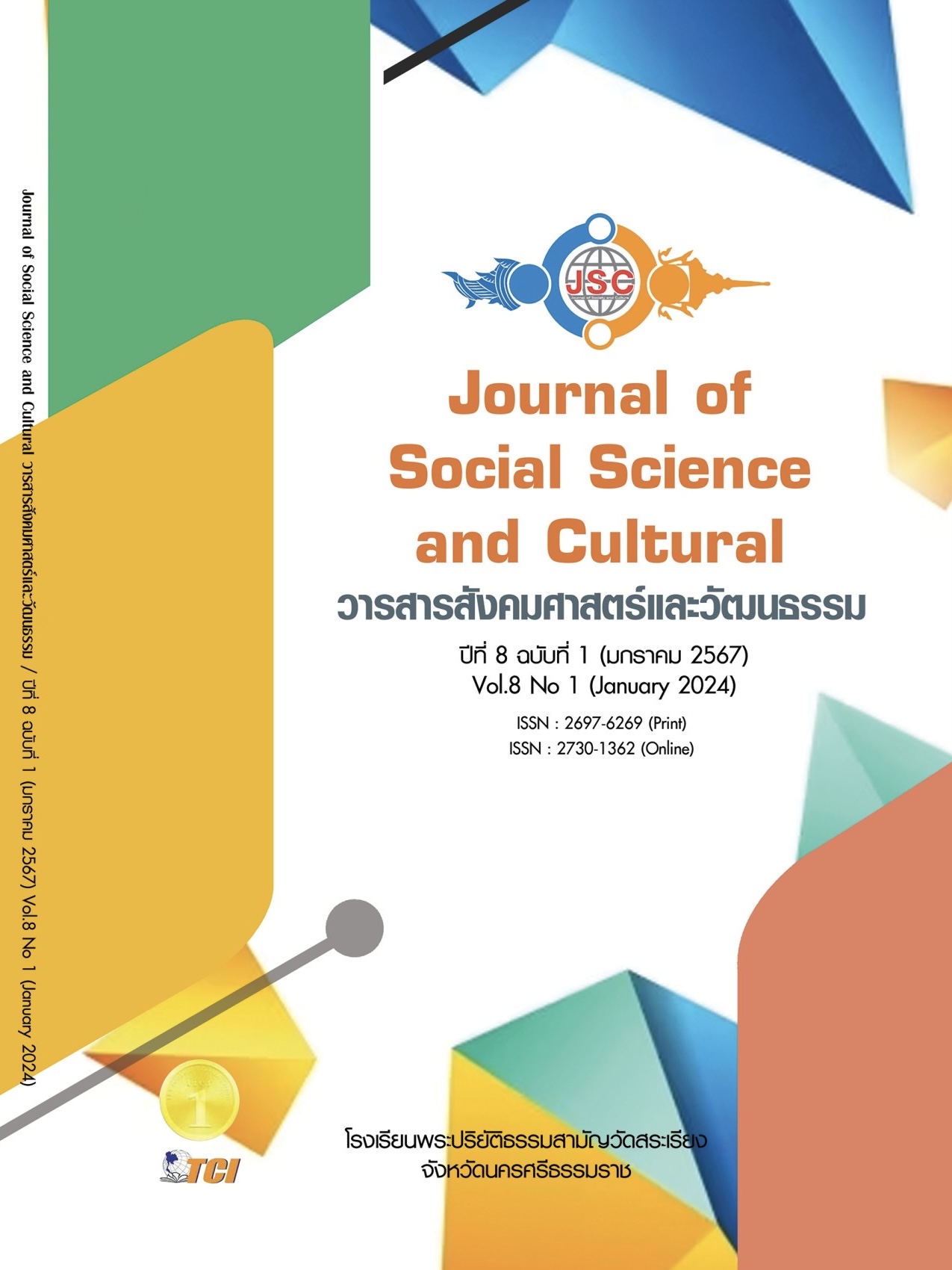A STUDY OF MIDDLE ADOLESCENCE IDENTITY OF SECONDARY SCHOOL STUDENTS
Main Article Content
Abstract
Middle adolescent identity of secondary school students is crucial for their growth into adults, as they will need to navigate life alongside diverse individuals in terms of gender, age, appearance, religion, and culture. This involves leading a life in society by demonstrating appropriate behaviors and reflecting the social development of adolescents. In enhancing the identity of students at the secondary school level, post-modern ideas are used that focus on learning to live together in society. Along with developing one's identity from criticizing what is happening in society, then revisiting, and changing one's identity through reflection from society. To lead to appropriate expression in society within the environment and context in which teenagers live. The research objectives are: 1) to study the middle adolescent identity of secondary school students, and 2) to examine behaviors indicative of the middle adolescent identity of secondary school students. In this used a qualitative research method, data were collected from documents, textbooks, academic journals, and relevant research, along with interviews with 16 students and their parents. The study finds that the middle adolescent identity of secondary school students refers to behavioral expressions resulting from their understanding of themselves in the societal context. It involves interpreting, assessing, and decision-making to create suitable options for expression in society, comprising three components: 1) Know your self, 2) Know your society and 3) Know your expression and Behaviors indicating The middle adolescent identity of secondary school students consist of ten behaviors indicating. The middle adolescent identity of secondary school students is significant for shaping their own identity through language and practices existing in society.
Article Details
References
จำเนียร จวงตระกูล. (2561). ปัญหาการกำหนดกลุ่มตัวอย่างและวิธีการสุ่มตัวอย่างในการวิจัยเชิงคุณภาพ. วารสารบริหารธุรกิจสังคมศาสตร์ มหาวิทยาลัยรามคำแหง, 9(1), 21-53.
นักเรียนคนที่ 4. (15 สิงหาคม 2565). การแสดงออกของพฤติกรรมของนักเรียนที่ไม่ควรปฏิบัติในเหตุการณ์วิกฤต. (นักเรียนคนที่ 4, ผู้สัมภาษณ์)
ผู้ปกครองคนที่ 1. (5 สิงหาคม 2565). มุมมองที่มีต่อสภาพของสังคมที่มีผลต่อการใช้ชีวิตของลูกท่านเอง. (ผู้ปกครองคนที่ 1, ผู้สัมภาษณ์)
ผู้ปกครองคนที่ 2. (6 สิงหาคม 2565). ความเข้าใจที่มีต่อการแสดงออกของพฤติกรรมลูกท่านเอง. (ผู้ปกครองคนที่ 2, ผู้สัมภาษณ์)
ผู้ปกครองคนที่ 3. (8 สิงหาคม 2565). การยอมรับในกฎระเบียบของสังคม เมื่อต้องแสดงพฤติกรรมออกไปในสังคม. (ผู้ปกครองคนที่ 3, ผู้สัมภาษณ์)
ระเบียบรัตน์ พงษ์พานิช. (2557). เสี่ยร้านมือถือ แฉพลีกายแลกไอโฟนเกลื่อน เจ๊เบียบฉะสังคมเสื่อม. เรียกใช้เมื่อ 8 เมษายน 2564 จาก https://www.thairath.co.th/news/local/bangkok/462685
ศรีเรือน แก้วกังวาล. (2540). จิตวิทยาพัฒนาการชีวิตทุกช่วงวัย (พิม์ครั้งที่ 7). กรุงเทพมหานคร: มหาวิทยาลัยธรรมศาสตร์.
สาวิตรี เต็งณฤทธิ์ศิริ. (2547). ลักษณะมุ่งอนาคตของนักเรียนชั้นมัธยมศึกษาตอนปลาย ในเขตอำเภอเมือง จังหวัดน่าน. ใน วิทยานิพนธ์มหาบัณฑิต สาขาวิชาจิตวิทยาการศึกษา. จุฬาลงกรณ์มหาวิทยาลัย.
สำนักงานคณะกรรมการการศึกษาขั้นพื้นฐาน. (2560). มาตรฐานการเรียนรู้และตัวชี้วัด กลุ่มสาระการ เรียนรู้คณิตศาสตร์ วิทยาศาสตร์ และสาระภูมิศาสตร์ ในกลุ่มสาระการเรียนรู้สังคมศึกษา ศาสนา และวัฒนธรรม ฉบับปรับปรุง พ.ศ. 2560 ตามหลักสูตรแกนกลางการศึกษาขั้นพื้นฐาน พ.ศ. 2551. กรุงเทพมหานคร: ชุมนุมสหกรณ์การเกษตรแห่งประเทศไทย.
สำนักงานคณะกรรมการพัฒนาการเศรษฐกิจและสังคมแห่งชาติ. (2560). แผนพัฒนาเศรษฐกิจและสังคมแห่งชาติ ฉบับที่ 12 (พ.ศ. 2560 - 2564). กรุงเทพมหานคร: สำนักงานคณะกรรมการพัฒนาการเศรษฐกิจและสังคมแห่งชาติ.
อภิญญา เฟื่องฟูสกุล. (2546). อัตลักษณ์: การทบทวนทฤษฎีและกรอบแนวคิด. กรุงเทพมหานคร: คณะกรรมการ สภาวิจัยแห่งชาติ สาขาสังคมวิทยา.
Erikson, E. (1968). Identity: Youth and Crisis. New York: W.W. Norton.
Foucault, M. (1988). Technologies of the self. in L.H. Martin, H. Gutman, P. H. Hutton, Technologies of the Self: A Seminar with Michael Foucault. London: Tavistock.
Hall, S. (1997). Representation: Cultural Representations and Signifying Practices. London: Sage.
Marshall, G. (1998). Oxford Dictionary of Sociology. New York: Oxford university.
Scott, J. (2006). Documentary Research. London: Sage.


